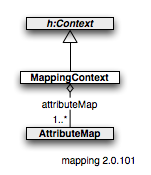Notice: This Wiki is now read only and edits are no longer possible. Please see: https://gitlab.eclipse.org/eclipsefdn/helpdesk/-/wikis/Wiki-shutdown-plan for the plan.
Difference between revisions of "Mapping vocabulary"
(→Mapping Functions) |
(→Mapping Functions) |
||
| Line 17: | Line 17: | ||
==Mapping Functions== | ==Mapping Functions== | ||
| + | NOTE: I renamed all functions starting with "role" (e.g. rolePathLiteral) to omit the "role" word--it was getting tedious/repetitive. I also eliminated mentioning the "roles" parameter--again tedious/repetitive. | ||
| + | |||
@@@TODO complete the following; or should these just be representative? | @@@TODO complete the following; or should these just be representative? | ||
| − | + | pathLiteral (link, att) | |
| − | * find the <code>p:Person</code> by '' | + | * find the <code>p:Person</code> by ''role[]'' |
* find complex attributes of type ''link'' find a target entity e1 | * find complex attributes of type ''link'' find a target entity e1 | ||
* if found return the value of attribute ''att'' of e1 | * if found return the value of attribute ''att'' of e1 | ||
| − | + | pathClassRDFValue (link, class) | |
| − | * find the <code>p:Person</code> by | + | * find the <code>p:Person</code> by ''role[]'' |
* find complex attributes of type ''link'' for an object of class ''class'' | * find complex attributes of type ''link'' for an object of class ''class'' | ||
* if found return the rdf:value | * if found return the rdf:value | ||
| − | + | pathClassLiteral(link, class, att) | |
| − | * find the <code>p:Person</code> by '' | + | * find the <code>p:Person</code> by ''role[]'' |
* find complex attributes of type ''link'' whose value is of class ''class'' | * find complex attributes of type ''link'' whose value is of class ''class'' | ||
* return (literal) value of ''att'' attribute | * return (literal) value of ''att'' attribute | ||
| − | currentEmployerName ( | + | currentEmployerName () |
| − | * find the <code>p:Person</code> by '' | + | * find the <code>p:Person</code> by ''role[]'' |
* find the <code>h:start..h:end ranges</code> for all osoc:jobs | * find the <code>h:start..h:end ranges</code> for all osoc:jobs | ||
* return list of all <code>osoc:name</code> values | * return list of all <code>osoc:name</code> values | ||
| − | timeAtCurrentEmployer ( | + | timeAtCurrentEmployer () |
| − | * find the <code>p:Person</code> by '' | + | * find the <code>p:Person</code> by ''role[]'' |
* find the <code>h:start..h:end ranges</code> ranges for all <code>osoc:jobs</code> | * find the <code>h:start..h:end ranges</code> ranges for all <code>osoc:jobs</code> | ||
* return list of all <code>osoc:name</code> values | * return list of all <code>osoc:name</code> values | ||
Revision as of 00:16, 12 November 2010
{{#eclipseproject:technology.higgins|eclipse_custom_style.css}}Vocabulary for attribute schema mapping rules. Imported by Persona vocabulary.
Files
- Most recently published
- Svn source: mapping.owl
UML Overview
Classes
@@@TODO
Attributes
@@@TODO
Mapping Functions
NOTE: I renamed all functions starting with "role" (e.g. rolePathLiteral) to omit the "role" word--it was getting tedious/repetitive. I also eliminated mentioning the "roles" parameter--again tedious/repetitive.
@@@TODO complete the following; or should these just be representative?
pathLiteral (link, att)
- find the
p:Personby role[] - find complex attributes of type link find a target entity e1
- if found return the value of attribute att of e1
pathClassRDFValue (link, class)
- find the
p:Personby role[] - find complex attributes of type link for an object of class class
- if found return the rdf:value
pathClassLiteral(link, class, att)
- find the
p:Personby role[] - find complex attributes of type link whose value is of class class
- return (literal) value of att attribute
currentEmployerName ()
- find the
p:Personby role[] - find the
h:start..h:end rangesfor all osoc:jobs - return list of all
osoc:namevalues
timeAtCurrentEmployer ()
- find the
p:Personby role[] - find the
h:start..h:end rangesranges for allosoc:jobs - return list of all
osoc:namevalues


